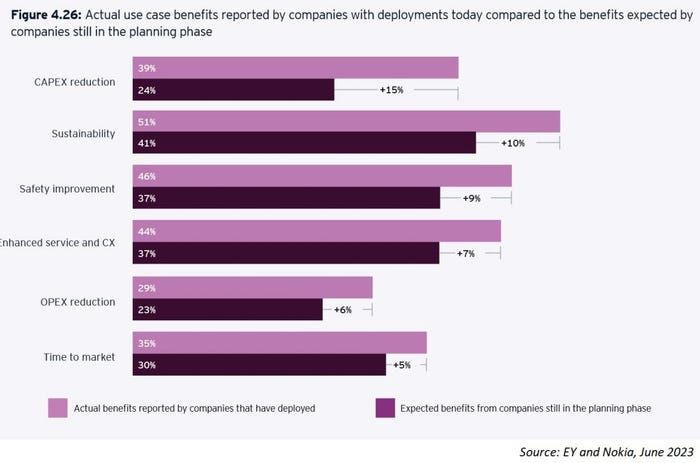Industrial and enterprise metaverse 'exceeding expectations' – surveyIndustrial and enterprise metaverse 'exceeding expectations' – survey
An industrial metaverse revolution is already underway, albeit quietly, according to a new study by Nokia and Ernst and Young.
June 12, 2023

An industrial metaverse revolution is already underway, albeit quietly, according to a new study by Nokia and Ernst and Young.
With the hype train currently on a tour of generative AI and the surrounding environs, there is a pervading sense that the metaverse is a rapidly-diminishing speck in the rear-view mirror.
The word was noticeably absent from Apple’s press release last week about its new and eye-wateringly expensive mixed reality (XR) headset, Vision Pro. It is clearly designed with enterprise metaverse experiences in mind, but the iPhone maker prefers the word ‘spatial’ instead, espousing the benefits of spatial computing, spatial experiences, and spatial content. It doesn’t want to be tarnished with the metaverse brush.
But while a cloud of scepticism continues to hang over the consumer side of the metaverse market, when it comes to enterprise and industrial use cases, the weather is decidedly sunnier.
According to Nokia and EY’s survey, early metaverse adopters are achieving improvements in capex and opex reduction that exceed their expectations by 15% and 6% respectively. There are also noteworthy gaps between expectation and reality when it comes to safety improvement and enhanced customer experience and service (see chart below).

These encouraging results have improved the general perception of the metaverse among enterprise and industrial users. On average, 80% of those who have already implemented metaverse use cases believe they will have a significant or transformational impact on the way they do business. Only 2% of respondents see the metaverse as a buzzword or a fad.
“The industrial and enterprise metaverses are here, this study shows the clear appetite for these technologies such as extended reality and digital twins to achieve business goals,” said Vincent Douin, executive director of business consulting and business transformation at Ernst and Young, in a statement. “We are already seeing many organisations going above and beyond the planning stages and recognising tangible benefits from their initial implementations.”
Both Nokia and EY have horses in this race, so it’s no surprise that they are sharing a survey that waxes lyrical about the benefits of industrial and enterprise metaverse applications.
EY late last year announced the launch of a metaverse version of its Wavespace co-working service – which is essentially a load of fancy meeting rooms dotted around the globe that enable staff from different offices to get together and hammer out ideas. It also launched a metaverse lab in the US that lets developers build and test out new metaverse use cases.
As for Nokia, enterprise – and in particular industrial – metaverse fits in with its Industry 4.0 strategy, which revolves around the deployment of advanced, mission-critical comms networks to support the digitalisation and automation of more and more processes.
It is little wonder then that Nokia highlighted reliable, high-speed connectivity among respondents’ highest priorities for enabling metaverse use cases.
“It is great to see that companies clearly believe in the power of the metaverse for business value creation in both enterprise and industrial use cases,” Thierry E. Klein, president of Bell Labs Solutions Research, Nokia.
“This strongly aligns with our vision, informed by more than eight years of research at Nokia Bell Labs, that the industrial metaverse is an extension of Industry 4.0,” he continued. “Consequently, those who have already implemented mission-critical communications networks for Industry 4.0 are now well placed to experience the benefits of the metaverse that clearly some companies are already seeing.”
Get the latest news straight to your inbox. Register for the Telecoms.com newsletter here.
About the Author
You May Also Like










.png?width=300&auto=webp&quality=80&disable=upscale)


_1.jpg?width=300&auto=webp&quality=80&disable=upscale)